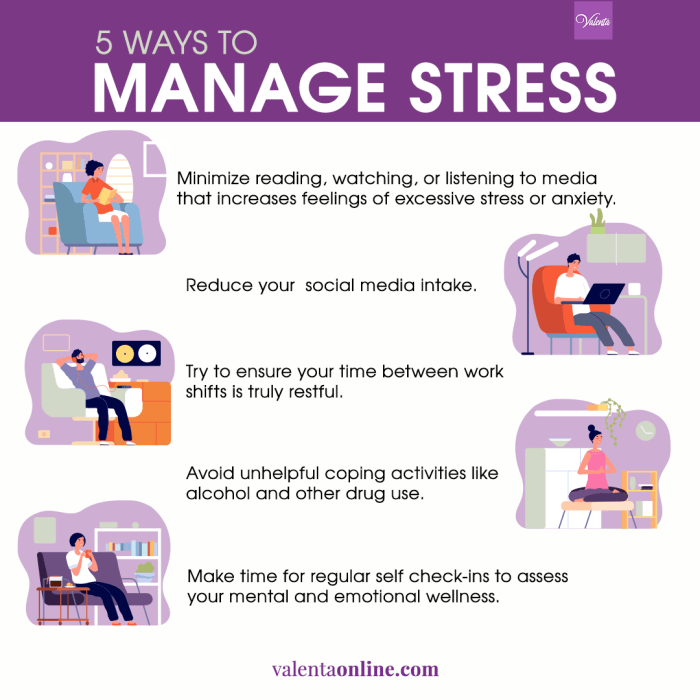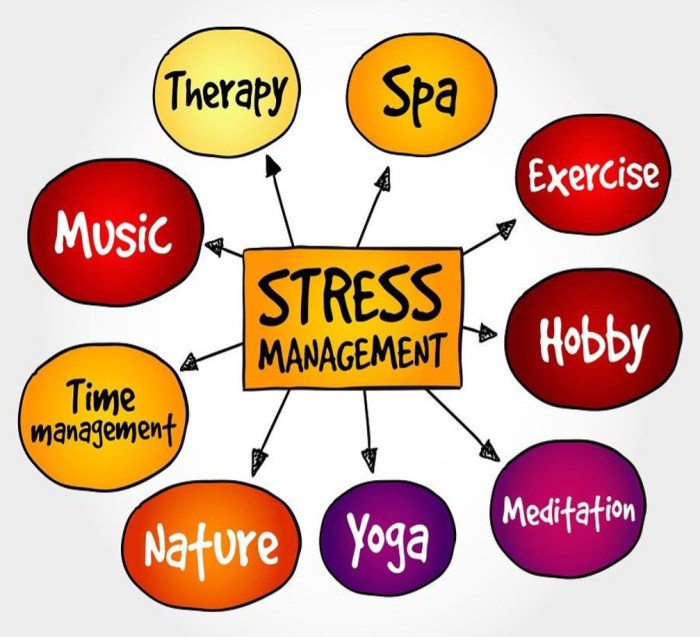Stress Management Tips: Buckle up as we dive into the ultimate guide on handling stress with swagger and confidence. From understanding the ins and outs of stress to mastering effective techniques, get ready to take charge of your well-being like a high school hip pro.
In this guide, we’ll explore the various aspects of stress management, including identifying signs of stress, effective techniques for managing it, healthy lifestyle habits, time management strategies, and seeking support when needed. So, grab your headphones, put on your favorite playlist, and let’s kick stress to the curb together.
Understanding Stress
Stress is a natural response to challenges or demands in life that can affect both our mind and body. It triggers the “fight or flight” response, releasing hormones like cortisol and adrenaline to prepare us for action.
Common Causes of Stress
- Work or school pressure
- Financial worries
- Relationship problems
- Health concerns
- Major life changes
Good Stress (Eustress) vs. Bad Stress (Distress), Stress Management Tips
Eustress is a positive type of stress that can motivate us to achieve our goals, while distress is the negative kind that can be harmful to our physical and mental well-being. Finding the right balance is essential for a healthy lifestyle.
Identifying Signs of Stress: Stress Management Tips
Stress can manifest in various ways, impacting individuals physically, emotionally, and behaviorally. Recognizing the early signs of stress is crucial in managing it effectively.
Physical Signs of Stress
- Headaches
- Fatigue
- Muscle tension
- Stomach issues
Emotional Signs of Stress
- Anxiety
- Irritability
- Sadness
- Feeling overwhelmed
Behavioral Signs of Stress
- Changes in eating habits
- Increased substance use
- Social withdrawal
- Difficulty concentrating
Effective Stress Management Techniques

In order to effectively manage stress, it is important to incorporate various techniques into your daily routine. By implementing relaxation strategies, engaging in regular exercise, and setting boundaries, you can effectively reduce stress levels and improve your overall well-being.
Relaxation Techniques
- Deep Breathing: Practice deep breathing exercises to help calm your mind and body. Inhale deeply through your nose, hold for a few seconds, and exhale slowly through your mouth.
- Meditation: Set aside time each day to meditate and focus on the present moment. This can help reduce anxiety and promote relaxation.
- Mindfulness: Incorporate mindfulness practices into your daily routine by staying present and aware of your thoughts and feelings. This can help reduce stress and increase self-awareness.
Benefits of Regular Exercise
Regular exercise plays a crucial role in reducing stress levels and improving overall mental health. Engaging in physical activity releases endorphins, which are known as “feel-good” hormones that help combat stress and boost mood. Exercise also helps improve sleep quality, increase energy levels, and reduce symptoms of anxiety and depression.
Setting Boundaries
Setting boundaries is essential for managing stress and preventing burnout. Learn to say no to additional responsibilities or commitments that may add unnecessary stress to your life. By prioritizing your well-being and setting limits on what you can handle, you can create a healthier work-life balance and reduce overall stress levels.
Healthy Lifestyle Habits
Eating well, sleeping enough, and staying connected with others are key components of a healthy lifestyle that can help manage stress effectively.
Nutrition and Stress Management
Nutrition plays a crucial role in managing stress levels. Eating a well-balanced diet rich in fruits, vegetables, whole grains, and lean proteins can provide the necessary nutrients to support your body during stressful times. Avoiding excessive caffeine, sugar, and processed foods can also help regulate mood and energy levels.
Adequate Sleep for Stress Reduction
Getting enough sleep is essential for reducing stress. Aim for 7-9 hours of quality sleep each night to allow your body and mind to rest and recharge. Establishing a bedtime routine, creating a comfortable sleep environment, and avoiding screens before bed can all contribute to better sleep quality.
Maintaining Social Connections for Stress Management
Maintaining social connections is another important aspect of managing stress. Spending time with friends, family, or participating in group activities can provide emotional support, reduce feelings of loneliness, and boost mood. Whether it’s through in-person interactions or virtual meetups, staying connected with others can help alleviate stress and promote overall well-being.
Time Management Strategies
Managing your time effectively can greatly reduce stress levels and increase productivity. By prioritizing tasks and avoiding procrastination, you can stay on top of your responsibilities and feel more in control of your day.
Use the Pomodoro Technique
The Pomodoro Technique is a popular time management method that involves breaking work into intervals, typically 25 minutes long, separated by short breaks. This technique can help improve focus and prevent burnout by allowing for regular rest periods.
Remember to set a timer for each work interval and take a short break after completing a Pomodoro cycle.
Create a Daily or Weekly Schedule
Developing a schedule can help you allocate time for different tasks and ensure that you are making progress on important projects. By planning out your day or week in advance, you can reduce the feeling of being overwhelmed and increase your overall efficiency.
- Start by listing all the tasks you need to accomplish.
- Assign specific time slots to each task based on priority.
- Include breaks and downtime to prevent burnout.
Seeking Support

Seeking support is crucial when dealing with stress. Whether it’s reaching out to friends, family, or professionals, having a support system can make a big difference in managing stress effectively.
Importance of Seeking Help
- It helps in sharing your feelings and thoughts, which can lighten the emotional burden.
- Getting different perspectives can offer new insights and solutions to your problems.
- Support from others can provide comfort and reassurance during challenging times.
Benefits of Joining Support Groups or Therapy Sessions
- Being part of a support group creates a sense of community and belonging.
- Therapy sessions offer professional guidance and tools to cope with stress effectively.
- Both settings provide a safe space to express emotions and receive validation.
Tips on Effective Communication
- Be honest and open about your feelings without fear of judgment.
- Use “I” statements to express your emotions and avoid blaming others.
- Listen actively to others and show empathy towards their experiences.






